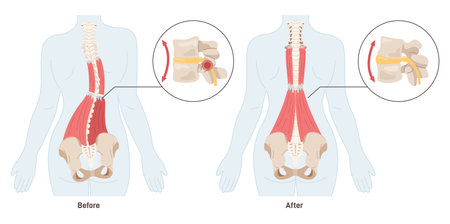Understanding Office-Related Back Pain in the UK
Back pain is a growing concern among British office workers, with recent surveys suggesting that over half of UK employees experience some form of back discomfort during their working lives. This issue is deeply intertwined with the modern British workplace culture, which often involves long hours spent at desks, frequent use of computers, and limited opportunities for movement throughout the day. The traditional office environment, paired with the UKs unpredictable weather that may discourage outdoor activity, creates a perfect storm for musculoskeletal issues. Poor posture, inadequate ergonomic setups, and a tendency to work through breaks are common habits seen across many British offices. These factors not only contribute to the prevalence of back pain but can also lead to more chronic health concerns if left unaddressed. Understanding these cultural and workplace habits is the first step towards finding effective solutions, such as integrating Pilates into daily routines to help manage and prevent discomfort.
2. The Essentials of Pilates for Spinal Health
Pilates is a gentle yet highly effective exercise system, renowned across the UK and globally for its focus on core strength, posture, and overall well-being. Developed by Joseph Pilates in the early 20th century, it draws inspiration from yoga, ballet, and ancient Greek training techniques. For British office workers who spend hours seated at a desk or commuting by train, Pilates provides a practical solution to address common back discomfort.
The Core Principles of Pilates
At its heart, Pilates revolves around several core principles that support spinal health:
| Pilates Principle | Description | Benefit for Office Workers |
|---|---|---|
| Breath | Controlled breathing patterns to engage the core | Reduces tension and improves focus during stressful workdays |
| Concentration | Mental focus on precise movements | Promotes mindfulness, helping manage workplace stress |
| Control | Deliberate muscle engagement to avoid strain | Reduces risk of injury from sudden or awkward movements |
| Centredness (Core Stability) | Strengthening deep abdominal and back muscles | Supports better sitting posture and long-term spinal health |
| Precision | Attention to correct alignment and technique | Aids in developing balanced muscle use, offsetting desk-induced imbalances |
| Flow | Smooth transitions between exercises | Encourages fluid movement, counteracting stiffness from prolonged sitting |
The Benefits for Posture and Long-Term Back Health
Pilates offers tangible benefits for those grappling with back pain in a typical British office setting. By focusing on the stabilising muscles around the spine—often neglected in everyday life—Pilates helps realign posture, making it easier to maintain a neutral spine whether you’re at your workstation or on the move. Improved postural awareness means you’ll naturally adjust your seating position throughout the day, minimising slouching and uneven weight distribution.
Pilates vs Traditional Exercise: A Comparison for Office Workers
| Aspect | Pilates Approach | Traditional Exercise Approach |
|---|---|---|
| Focus Area | Core stability & spinal alignment | Larger muscle groups & cardiovascular fitness |
| Impact on Back Pain | Directly targets back-supporting muscles; preventative and rehabilitative | May not address specific postural issues or core weakness directly |
| Suitability in Office Life | Easily adapted to short routines at home or office; low-impact and accessible for most abilities | Often requires more space, equipment or time commitment; higher impact options may aggravate symptoms if not performed correctly |
Cultivating Long-Term Wellness through Regular Practice
The beauty of Pilates lies in its adaptability. Whether attending a class at your local leisure centre in Manchester or following an online session during your lunch break in London, regular practice builds resilience against future back discomfort. By embedding these foundational Pilates principles into your daily routine, you’re investing in a healthier spine—helping you feel more energised both at work and beyond.
![]()
3. Simple Pilates Moves for the British Office
Pilates need not be confined to the studio—many gentle movements can be woven into your daily office routine, right at your desk. With most British office workers spending long hours seated, it’s important to integrate short bursts of movement to ease tension and support spinal health. Here are a few easy-to-follow Pilates exercises you can practise discreetly in the workplace, no mat or special attire required.
Seated Spine Twist
Sit tall on your chair with both feet flat on the floor and knees hip-width apart. Place your hands gently on your thighs. Inhale deeply, lengthening your spine, then exhale as you slowly twist your upper body to one side, keeping your hips square. Hold for a breath, return to centre, and repeat on the other side. This move encourages spinal mobility and is ideal during a tea break or after a long conference call.
Shoulder Rolls
Office work often leads to tight shoulders. Sit upright, let your arms relax by your sides, and slowly roll your shoulders forwards in a circular motion for five counts. Reverse the direction for another five counts. This simple exercise helps release built-up tension from hunching over computers and paperwork—a common sight in British workplaces.
Desk Chest Opener
Sit near the edge of your chair with feet firmly grounded. Interlace your fingers behind your back and gently straighten your arms, lifting them slightly as you open up across your chest. Take three slow breaths here, feeling the stretch across the front of your body. This helps counteract the rounded posture caused by working at a desk all day.
Ankle Circles
While sitting, extend one leg forward and rotate your ankle in small circles—five times clockwise, then anti-clockwise. Switch legs and repeat. This move promotes healthy circulation during long stretches at your workstation, especially helpful if you’re based in a busy London office or frequently on Teams calls.
A Gentle Reminder
Remember, consistency is key. Setting reminders or pairing these moves with regular tasks (like waiting for the kettle to boil) makes it easier to stick with them throughout the day. These subtle Pilates exercises blend seamlessly into the typical UK office environment, supporting a more comfortable and productive workday.
4. Preventive Lifestyle Tips Beyond Exercise
While Pilates plays a vital role in alleviating and preventing back pain, adopting a holistic approach in the British office environment can provide even greater benefits. Here are some practical strategies that go beyond exercise, helping you to manage discomfort and foster well-being throughout your workday.
Ergonomics: Setting Up Your Workspace
Proper desk set-up is fundamental for maintaining spinal health. Many UK offices now encourage ergonomic assessments, and even home workers can benefit from small adjustments. Ensure your chair supports your lower back, keep your feet flat on the floor, and position your screen at eye level. Below is a quick reference table for optimal desk ergonomics:
| Element | Recommended Adjustment |
|---|---|
| Chair Height | Knees at 90°, feet flat on the floor |
| Screen Position | Top of screen at or just below eye level |
| Keyboard & Mouse | Elbows close to body, wrists straight |
Mindful Movement: Integrating Subtle Activity
The British work culture often involves long periods of sitting, punctuated by tea breaks or brief walks around the office. Embrace these moments for gentle stretches or standing meetings. Try shoulder rolls, neck stretches, or simply standing while taking phone calls to reduce stiffness and boost circulation.
The Power of Regular Breaks
UK workplace guidelines recommend taking short breaks throughout the day—ideally five minutes every hour. Use these pauses not just for a cuppa, but also to step away from your desk, stretch, or do a quick Pilates-inspired movement. This habit helps reset posture and relieves pressure on the spine.
Cultivating a Supportive Office Culture
Encourage colleagues to join in with wellbeing initiatives such as lunchtime walking groups or desk-based stretch sessions. Many British companies are now embracing wellness programmes; consider suggesting simple changes like standing desks or flexible break schedules to HR.
Nourishing Your Body for Back Health
A balanced diet rich in anti-inflammatory foods—such as oily fish, leafy greens, and whole grains—can also support musculoskeletal health. Staying hydrated with water or herbal teas (a British staple!) keeps your tissues supple and joints moving freely.
5. Seeking Support: When to Consult a Professional
While Pilates can be a gentle and effective way to manage minor back discomfort, it’s important to recognise when your symptoms require professional attention. Persistent pain that lasts for several weeks, radiates down your legs, or is accompanied by numbness, weakness, or changes in bladder or bowel control should never be ignored. In the context of British office life, where sitting for long periods is common, taking early action is key to preventing more serious problems.
Recognising When Back Pain Needs Extra Help
If your back pain is interfering with daily activities, sleep, or work—even after adopting regular movement routines like Pilates—it’s wise to consult a healthcare professional. Likewise, if you have a previous history of spinal conditions or injuries, seeking advice before starting any new exercise programme is recommended. Early intervention can help you avoid unnecessary discomfort and support long-term wellbeing.
Utilising UK-Specific Resources
The NHS offers a range of resources for those experiencing back pain. You can start by booking an appointment with your GP, who may refer you to physiotherapy or specialist musculoskeletal services. Many areas also offer self-referral options for physiotherapy through the NHS website. For tailored advice on safe movement and strengthening, consider finding a local Pilates instructor registered with reputable organisations such as Body Control Pilates or the Pilates Foundation UK. These instructors are trained to modify exercises based on individual needs and health backgrounds.
Supportive Workplace Policies
It’s also worth exploring workplace support available under UK employment law, including occupational health assessments or reasonable adjustments to your desk set-up. Many employers provide access to Employee Assistance Programmes (EAPs) or subsidised fitness classes—including Pilates—so it’s always worth checking what’s available.
By staying mindful of your body’s signals and making use of both NHS and local resources, you can manage back pain proactively and ensure that Pilates remains a safe and enjoyable part of your office wellbeing routine.
6. Cultivating a Back-Friendly Office Culture
Creating a back-friendly office culture in the UK goes beyond offering ergonomic chairs or standing desks. It’s about fostering an environment where employee wellbeing truly comes first, and where Pilates and other healthy habits are woven into the daily rhythm of work life. British workplaces can begin by encouraging open conversations about back pain and discomfort, helping to remove any lingering stigma around these common issues. When employees feel comfortable discussing their health concerns, they are more likely to seek support early on—helping to prevent chronic problems down the line.
One practical step is to introduce workplace wellness initiatives that include Pilates sessions, either on-site or virtually. These classes not only strengthen core muscles but also offer a gentle way for staff to unwind and reset during a busy day. Managers can lead by example, actively participating in these sessions and reminding staff that taking care of their bodies is part of being productive at work.
Additionally, small shifts in office routines can make a significant difference. Encouraging regular movement breaks, providing guidance on proper desk posture, and sharing resources about back-friendly exercises all contribute to a healthier workspace. Even simple reminders—like posters or weekly emails—can nudge employees towards healthier habits without feeling intrusive.
Importantly, cultivating this culture requires genuine commitment from leadership. By prioritising employee wellbeing and inviting input from staff, British offices can create spaces where health is valued as much as hard work. Over time, this approach not only helps manage and prevent back pain but also builds a stronger, happier workforce—one that feels supported both physically and emotionally.


